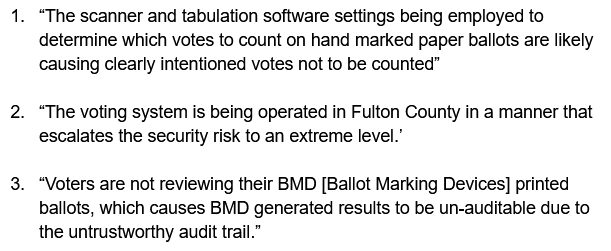1) Pre-Election Concerns Over Dominion Voting Systems Highlighted in Georgia Lawsuit
Cyber security expert raised concerns over integrity of system, including external vulnerabilities, in sworn Aug 24, 2020 statement
My latest @EpochTimes https://www.theepochtimes.com/pre-election-concerns-over-dominion-voting-systems-highlighted-in-georgia-lawsuit_3576863.html
Cyber security expert raised concerns over integrity of system, including external vulnerabilities, in sworn Aug 24, 2020 statement
My latest @EpochTimes https://www.theepochtimes.com/pre-election-concerns-over-dominion-voting-systems-highlighted-in-georgia-lawsuit_3576863.html
2) In an Oct. 11 order, just weeks prior to the presidential election, U.S. District Judge Amy Totenberg agreed with the concerns associated with the new Dominion voting system, writing that the case presented “serious system security vulnerability and operational issues..."
3) These risks are neither hypothetical nor remote under the current circumstances,” Judge Totenberg wrote in her order.
Despite the court’s misgivings, Totenberg ruled against replacing the Dominion system right before the presidential election.
Despite the court’s misgivings, Totenberg ruled against replacing the Dominion system right before the presidential election.
4) An Aug. 24, 2020, declaration from Harri Hursti, an acknowledged expert on electronic voting security, provided a first-hand description of problems he observed during the June 9, 2020 statewide primary election in Georgia and the runoff elections on Aug. 11.
6) Hursti observed varying processing times at different locations, which raised concerns as identical physical devices “should not behave differently while performing the identical task of scanning a ballot.”
7) Hursti observed that “on multiple machines, while voters were attempting to vote, the ballot marking devices sometimes printed ‘test’ ballots.”
On election day, "the ballot marking device should not be processing or printing any ballot other than the one the voter is voting.”
On election day, "the ballot marking device should not be processing or printing any ballot other than the one the voter is voting.”
9) Hursti also noted that it appeared that Dominion personnel were the only ones with knowledge of, and access to, the Dominion server during the Aug 11, 2020 runoff elections.
Hursti referred to Dominion’s onsite operation and access as “an elevated risk factor.”
Hursti referred to Dominion’s onsite operation and access as “an elevated risk factor.”
10) Hursti also noted that the Dell computers running the Dominion server appeared not to have been “hardened” - the process of “securing a system by reducing its surface of vulnerability” - a deficiency Hursti called "unacceptable."
11) Hursti observed that computers used in vote processing appeared to have “home/small business companion software packages”.
Hursti: "Independent inquiry should be promptly made of all 159 counties to determine if the Dominion systems statewide share this major deficiency.”
Hursti: "Independent inquiry should be promptly made of all 159 counties to determine if the Dominion systems statewide share this major deficiency.”
12) Hursti noted that lack of “hardening” created security risks even for computers that were not connected to the internet.
When flash drives were connected, the “media was automounted by the operating system" meaning the operating system automatically interacted w/the device.
When flash drives were connected, the “media was automounted by the operating system" meaning the operating system automatically interacted w/the device.
13) Raising greater concerns was the apparent “complete access” that Dominion personnel appeared to have into the computer system.
Dominion technicians troubleshooted error messages which included access into the “Computer Management” application, indicating complete access.
Dominion technicians troubleshooted error messages which included access into the “Computer Management” application, indicating complete access.
14) Hursti: “This means there are no meaningful access separation and privileges and roles controls protecting the county’s primary election servers. This also greatly amplifies the risk of catastrophic human error and malicious program execution.”
15) During attempts to resolve the various issues that were occurring in real-time, Hursti noted that it appeared as though Dominion staff shifted from on-site attempts at remediation to off-site troubleshooting.
16) Hursti: “If in fact remote access was arranged and granted to the server, this has gravely serious implications for the security of the new Dominion system...it is transfer of control out of the physical perimeters and deny any ability to observe the activities.”
/END
/END

 Read on Twitter
Read on Twitter



